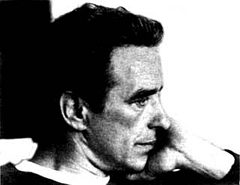
 John
Cassavetes (1929-1989), revolutionary independent filmmaker, whose
films explored everyday life as an emotional rollercoaster. Cassavetes
first entered the film industry as an actor, but found his true passion
while directing SHADOWS (1959). Creating a cinematic alternative to Hollywood,
Cassavetes challenged viewers with issues of interracial dating, familial
ties, and personal identity. Cassavetes continued to create films with
emotional complexity and mysterious subtext: FACES (1968), HUSBANDS (1970),
MINNIE AND MOSKOWITZ (1971), A WOMAN UNDER THE INFLUENCE (1974), THE KILLING
OF A CHINESE BOOKIE (1976 and 1978), OPENING NIGHT (1977), GLORIA (1980),
and LOVE STREAMS (1984). Cassavetes is known for his unconventional, experimental
methods for shaping performances: extensive rehearsals with freedom for
emotional improvisation. Cassavetes believed the raw truth of film relied
on honest preformances, thus, de-emphasizing the camera's role. Cassavetes
resented the Hollywood notion of the "money shot" or the use
of cinematography as an emotional guide.
John
Cassavetes (1929-1989), revolutionary independent filmmaker, whose
films explored everyday life as an emotional rollercoaster. Cassavetes
first entered the film industry as an actor, but found his true passion
while directing SHADOWS (1959). Creating a cinematic alternative to Hollywood,
Cassavetes challenged viewers with issues of interracial dating, familial
ties, and personal identity. Cassavetes continued to create films with
emotional complexity and mysterious subtext: FACES (1968), HUSBANDS (1970),
MINNIE AND MOSKOWITZ (1971), A WOMAN UNDER THE INFLUENCE (1974), THE KILLING
OF A CHINESE BOOKIE (1976 and 1978), OPENING NIGHT (1977), GLORIA (1980),
and LOVE STREAMS (1984). Cassavetes is known for his unconventional, experimental
methods for shaping performances: extensive rehearsals with freedom for
emotional improvisation. Cassavetes believed the raw truth of film relied
on honest preformances, thus, de-emphasizing the camera's role. Cassavetes
resented the Hollywood notion of the "money shot" or the use
of cinematography as an emotional guide.
Although Cassavetes' films remained faithful to his scripts, he let the actors have creative conrtol over his or her performance:
"I want the actors to express themselves according to their own dreams and emotions. Why would you put someone in a picture and tell them to be exactly like you want them to be? In a sense, they'd become you, and only you, and not exhibit any of what their personal nature is. I believe in my players having complete emotional rights..."
---------------
Cassavetes explaining his concept of "the mind's eye view of yourself,":
"It's a struggle. It's a struggle for you to be what you are. It's a struggle for other people to be what they are. I think it's a matter of being in touch with yourself and being able to think. There comes a time in people's lives when they just get so panicked and uptight that they can't really think with their own mind. They begin to think then with other people's minds. The things that are part of your life are your inner feelings. Your mind's eye view of yourself. If that isn't broken, you'd be a fantastic person all your life."
Reference: Cassavetes on Cassavetes : Compiled, Editied, and Annotated by Ray Carney, Professor of Film and American Studies at Boston University and Director of the Film Studies Program
Source: Shelley Friedman, nextPix
For more information, see www.cassavetes.com